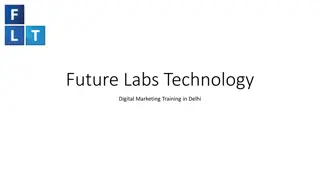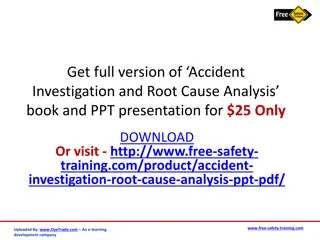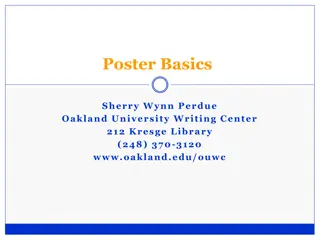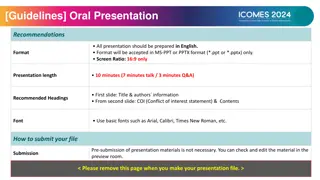
Idaho College Application Week and Post-Secondary Planning Guidance
Get ready for Idaho College Application Week from October 31st to November 4th! Counselors are available to help with applications. Learn about college priority deadlines, post-secondary planning tips, and professional technical programs. Prepare for your future in education or career with advice on applications, transcripts, scholarships, and more.
Download Presentation

Please find below an Image/Link to download the presentation.
The content on the website is provided AS IS for your information and personal use only. It may not be sold, licensed, or shared on other websites without obtaining consent from the author. If you encounter any issues during the download, it is possible that the publisher has removed the file from their server.
You are allowed to download the files provided on this website for personal or commercial use, subject to the condition that they are used lawfully. All files are the property of their respective owners.
The content on the website is provided AS IS for your information and personal use only. It may not be sold, licensed, or shared on other websites without obtaining consent from the author.
E N D
Presentation Transcript
Idaho College Application Week is October 31st-November 4th During this week, the counselors will assists help students with college applications during your government class. If you don t have a government class or in AP government please schedule an appointment with your counselor. College Priority Deadlines: University of Idaho-December 1st (application, transcript, FAFSA) Boise State University-February 15th (application, application fee, transcript, FAFSA, scholarship forms) Lewis-Clark State College-December 1st(application, transcript, FAFSA, scholarship forms)
Post-Secondary Planning Whether your plans are college (1 yr. 2 yr. or 4 yr.), military, apprenticeship or working: Take challenging and beneficial course work Maintain good grades Participate in extracurricular activities Engage in conversations about your future with FRIENDS, PARENTS, TEACHERS and COUNSELOR
College Applications: Obtain a copy of your transcript and resume. Allow ample time (weeks) to prepare your application. Request letters of recommendation and allow the people you ask ample time to complete them (two weeks minimum). Check your information for grammar and spelling. Request that official high school/college transcripts, ACT and/or SAT results be sent to the colleges of your choice from the registrar. Make a follow-up call to the college to make sure that they received your application and that your file is complete. Military: Take the ASVAB & Visit with a recruiter Working: Take classes that will teach you skills and employability Make connections with community business (volunteer, job shadow) Develop a resume Get involved in clubs, school and community organizations, and extra-curricular activities
Professional Technical Programs 1 year certificate 2 year associate degree Some programs you can work full time, employer may pay for college and you become a journeyman in 4 years Excellent employment opportunity and wages in many degree areas Visit Lewis Clark State College, North Idaho College, Walla Walla Community and the Work Force Training Program for degree opportunities.
Determining your future is a lifelong journey that requires many decisions along the way. Multiple opportunities await you, so prepare yourself for any option. The decisions are yours No matter where you are on your path to graduation, the State Board of Education provides tips, tools, and resources to help make sense of everything from college applications and financial aid to learning how to channel your interests and hobbies into a rewarding career choice. Know yourself Plan for School Pay for School Explore Careers Visit us online and learn how we can help make your next step exciting, rewarding, and manageable. www.NextSteps.Idaho.gov
Average Salary Based on Educational Attainment *Data collected from people ages 25 and over: Earnings are for full-time wage and salary workers. Source: Current Population Survey, U.S. Bureau of Labor Statistics, U.S. Department of Labor. Doctoral Degree Professional Degree Master s Degree Bachelor s Degree Associate Degree Some or No college High School Diploma $84,396 $89,128 $69,108 $57,616 $40,404 $37,804 $33,852
Check on Pages 5 and 6 in your books! Writing a College Essay Choosing a Career ASVAB, Ideas, visit with Mrs. Roby
The Campus Visit: is your ultimate research task. It s important to get a true feel of the campus vibe to see if the college is a good fit for you. Be sure to make the most of it by asking questions and keeping track of what you learn. Take part in a group information session at the admission office. Interview with an admission officer go prepared with questions - refer to your junior book Pick up financial aid forms Sit in on a college classes that interest you. Meet a professor who teaches a subject that interests you. Talk to students about what they think of their classes and professors. Get names and business cards of the people you meet so you can contact them later if you have questions, make sure you take something to write with during your visit. Explore Campus dorms, dining hall, fitness center, library, career center, bookstore Check out campus media newspaper, bulletin boards, schools website, etc Think about what you are looking for in a college, what is important to you? programs campus size clubs and organizations cost athletics location
Choosing the College that is Right for You Type of School Size of school Location Academic programs Activities Financial aid Campus Visits Think about what you are looking for in a college, what is important to you? programs campus size clubs and organizations cost athletics location
College Entrance Exams (ACT/SAT) these tests measure skills and help colleges evaluate how ready you are for college level work, some colleges may require SAT Subjects as well (the schools admission office can tell you if these are needed) Check with the college to see what scores you need for admission!!! The best way to prepare Work hard both inside and outside the classroom. Take challenging courses, study hard, and read and write as much as you can. Do your best on the PSAT. Use Kahn Academy and the testing organization websites to practice.
FINANCIAL AID FAFSA Obtain a FSA ID at https://fsaid.ed.gov. Your FSA ID can be used from year to year. Your parents will also need their own FSA ID. Submit the FAFSA online at http://www.fafsa.ed.gov as soon as possible AFTER October 1st. you will need the following documents to fill out the FAFSA Social Security # (parent and student) Driver s License # (student) Prior Year Tax Return Records of untaxed income Information on cash; savings and checking account balances; investments, including stocks, bonds and real estate but not including your home, business and farm assets When you receive the Student Aid Report (SAR) by mail or electronically READ IT CAREFULLY. Each school will tell you whether you are eligible for financial aid. If so, they also will explain how much grant, loan or work study money they can offer you.
Scholarships Check with your high school counselor and other sources about local, regional and national scholarships. Some require formal applications including essays or speeches. Many of these outside scholarships have deadlines in the fall or early spring. Apply early for scholarships. Do not apply for a scholarship if you do not meet the requirements. Proofread carefully for spelling and grammar mistakes. Keep a copy of the letters you send and the application forms that you fill out. Refer to them the next time you request information or apply for a scholarship. Starting in November, check out the counseling website for an updated Bengal Green every other week. This document lists all of the scholarships that are currently offered through the high school. Look at financial aid websites (see page 9). Check out information on the Western Undergraduate Exchange program. Certain out-of-state colleges offer reduced out-of-state tuition costs. Visit the website for more information: http://wiche.edu/sep/wue.
Educational Institution Email or call the financial aid office at each school in which you have an interest. Ask about financial aid possibilities and obtain their financial aid application, if necessary. Tell each school what you will or will not accept in their financial aid package.
Scholarship, College & Career Planning Resources on the Web Page 9
Transcript Review & Evaluation Check your graduation status- see your counselor if you have any questions !!! Look at your SAT scores? 500 EBRW 510 MATH Have a great day!!!!






















